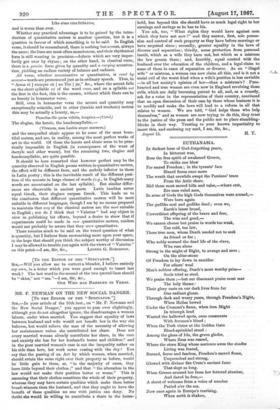MR. F. NEWMAN ON THE NEW SOCIAL DANGER. [To THE
EDITOR OF THE "SPECTATOR."]
SIR,—In your article of the 10th inst., on "Mr. F. Newman and the New Social Danger," you appear to pass over slightingly, although you do not altogether ignore, the disadvantages a woman labour, under when married. You suggest that equality of laws between husband and wife would not benefit her in the way she believes, but would relieve the man of the necessity of allowing her maintenance unless she contributed her share. Does not every married woman already contribute her share, in the care and anxiety she has for her husband's house and children? and in the poor married woman's case is not the inequality rather on his side than hers, her work never ceasing with the day ? You say that the passing of an Act by which women, when married, should retain the same right over their property as before, would be little gain to them, as, "in the majority of cases, they have little beyond their clothes ;" and that "the alteration in the law would not make their position better or worse." This is assuming that their clothes constitute the whole of their property, whereas they may have certain qualities which make them better bread-winners than the husband, and that they ought to have the benefit of these qualities no one with justice can deny. No doubt she would be willing to contribute a share to the house-
hold, but beyond this she should have as much legal right to her earnings and savings as he has to his.
You ask, too, "What rights they would have against men which they have not now?" and they answer, first, sole posses- sion and control of such property as they have before marriage or have acquired since ; secondly, greater equality in the laws of divorce and separation ; thirdly, some protection from personal insult, which as a wife they have not, but which as a mistress the law grants them ; and, fourthly, equal control with the husband over the education of the children, and a legal claim to some of them in cases of separation or divorce. As an "illegal wife" or mistress, a woman can now claim all this, and is it not a social evil of the worst kind when a wife's position is less enviable —in all but society's opinion of her—than a mistress's? Pure- hearted and true women are even now in England revolving these evils, which are daily becoming patent to all, and, as a remedy, ask for a voice in the representation of their country, convinced that an open discussion of their case by those whose business it is to modify and make the laws will lead to a reform in all that relates to women. We are told, "God helps those who help themselves," and as women are now trying to do this, they trust to the justice of the press and the public not to place stumbling- blocks in their way. Trusting to your known impartiality to insert this, and enclosing my card, I am, Sir, &c.,






























 Previous page
Previous page